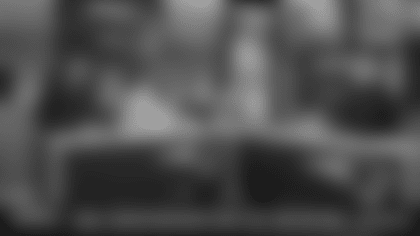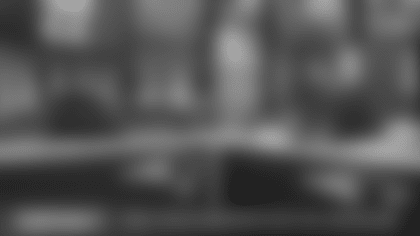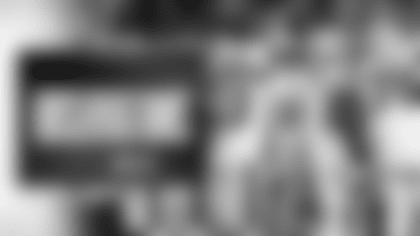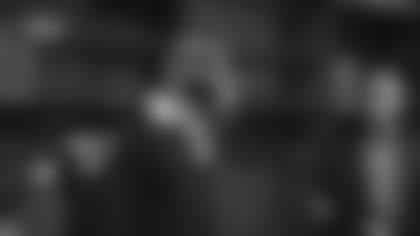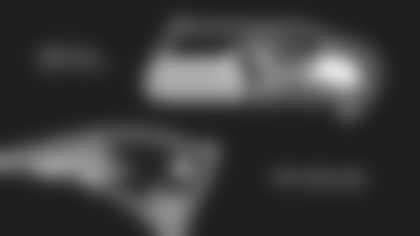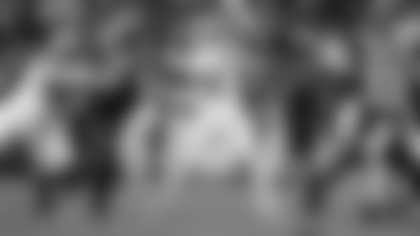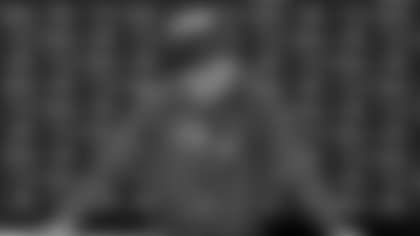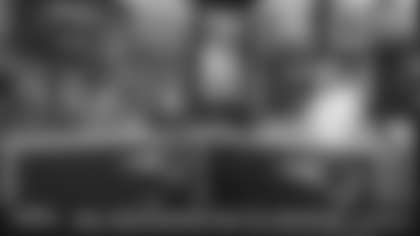[wysifield-embeddedaudio|eid="358676"|type="embeddedaudio"|view_mode="full"]Q: Julian Edelman came to you as a college quarterback, and now he's become one of your top receivers. What has enabled him to do that?
BB: Julian has worked very hard, worked very hard at everything - returning kicks, punts, become a receiver, we've used him on defense some as well, so he's always been a really hard worker. He's smart, he's tough - we saw that right away - but the overall improvement in the little things - technique and training, understanding little coaching points - things like that. He just keeps grinding at it. You can't really outwork Julian. He's always here early, stays late, works hard, so that's probably the biggest thing with him.
Q: Three days removed from the game, what would you be willing to share about the extent of Dominique Easley's injury? And how do you think Geneo Grissom played in his place?
BB: No updates on Easley, we'll just see how it goes. And Geneo played probably more than we expected him to play, maybe more than he expected to play. I thought he had some good plays, did some good things. There are certainly some things he needs to work on. You could say that about just about everybody who played, regardless of what their previous status or level of previous experience or anything else was. We did some good things, but we all have a long way to go and we all have a lot of things we can improve on.
Q: Regarding the Bills offensive system with Greg Roman, is that basically the 49ers there in Buffalo? Or are there some different things that stand out to you?
BB: I think that's a good question. Part of that is just again, preseason is preseason, and I would imagine that they were trying to do a lot of things, like we are, like everybody is trying to do - learn how to run your plays and be more consistent at doing those things and all that rather than doing a lot of game planning. We'll see starting today what Buffalo is trying to do. They'll put it all out there on the table like we all do every week in the National football League trying to win. We'll just have to see how all that unfolds. Certainly there are a lot of elements of the 49ers system, I'm not saying that. But as we go forward, how much of it is … Is it 100 percent, is it 80 percent or are there other influences? Does Greg kind of have his own spin on it that is different than maybe what [Jim] Harbaugh? I don't know, I can't answer those questions. We'll just have to see how the pattern unfolds here as they start playing regular season games, game planning and utilizing their personnel.
Q: Regarding the goal line shifts on the defensive line. One time they ran it in for a touchdown through a spot that was vacated by the shift, and another time you got them to false start. How do you balance the risk-reward of those shifts?
BB: I'd say it's like anything else you do - there is a risk-reward. The ball is on the one-yard line, sometimes you try to be aggressive and make a play. If you try to stop everything for as little as they need, a lot of times you stop nothing. If you try to be aggressive and you try to stop one particular thing or a certain type of play or a run to one side or the other, and you hit it right, you might be able to make a play. If you get it wrong, it's probably a relatively easy touchdown, but at that point, you're just kind of gambling sometimes to just try to make a play. You don't have very much ground to defend, so you've got to be aggressive to be able to make it. It's not just good enough to sort of sit there and do your job, be where you're supposed to be and then let the guy fall in from a yard away. You have to do more than that. I'd say there is an element of that in that type of situation.
Q: I know there is a rule against simulating the snap count. It looked like Jerod Mayo made the call to shift there. Is there a certain word you have to say?
BB: Yeah, "move."
Q: Is that all he has to do to make sure he avoids the official thinking he's trying to simulate the snap count?
BB: We're not trying to simulate anything. We're allowed to move on the defensive side of the ball and we're allowed to move together. Like, we don't have to move one at a time. If we move, then we make a call and we move. We're not trying to simulate anything. We're just trying to move the defense. That's perfectly legal. Defenses have done that for, I don't know, probably 75 years.
Q: I was just wondering if there was a word you had to use in particular so that no one interpreted it as an illegal call.
BB: There is nothing in the rule book about that, no.
Q: Is Tyrod Taylor better suited to that Greg Roman system? On defense, has Rex Ryan made any changes that you've noticed over the preseason?
BB: I think Rex has played variations of 4-3, 3-4. The same guys are at the end of the line. Whether you want to call the guy an end or an outside linebacker, I'm not sure - it's a matter of semantics. I think that's pretty similar. I don't see a lot of big changes there. What was the first part of the question?
Q: About Tyrod Taylor…
BB: The Ravens used him some in like gadget or Wildcat-type plays - those kind of plays - and so we've seen him do that before. I know that, or what you kind of hear through the grapevine, is that they always liked him in Baltimore. Obviously they liked [Joe] Flacco as well, which is understandable. But then when Taylor had a chance to go somewhere else, to go to Buffalo and probably given a chance to compete for a job there, he took that opportunity and it looks like he made the most of it. I don't think there's ever been anything negative about Taylor. I think there's always been a level of respect for his skill set, his athleticism and his playmaking ability at that position. He was just playing behind Flacco, so he didn't get many opportunities to do it.
Q: A lot of times a player has to move on to another situation to see what he can do. Is that fair to say?
BB: I'm just saying, what do we know about him? That's what we knew about him. We saw him play in Baltimore, he was athletic in Baltimore, he made plays running, he made plays scrambling, he made plays passing, and he looked like a pretty good quarterback, but it was on a very limited basis.
Q: How do you think the communication was on the offensive line Thursday night without Bryan Stork and Ryan Wendell?
BB: I think the way we talked about it before, there were some good things. I thought there were times we handled things really well. We had some tough looks deployed at us. We hit [Rob] Gronkowski on a long pass, the line came all the way over and picked up an overload blitz, and that really made the play. Obviously Rob was wide open and it was a relatively easy throw and an easy catch because of protection and the adjustment the line made. There were some good things. There were obviously some other things. We had some negative plays, negative runs, there were some things that could have been better, so it wasn't perfect. We've just got to keep working on that stuff to get it better, but there were some good things to build on, so hopefully we can take those positives and correct those mistakes and move on.
Q: What did you see from David Andrews over the spring and summer to have confidence to start him at center opening night?
BB: He's played center his whole life, so he's had a lot of experience at that position. [He] played at Georgia, four-year starter - high level of competition there. And then he's taken a lot of snaps for us this year in the spring all the way through training camp and into the opening game against Pittsburgh. He's had plenty of opportunities to practice and be familiar with everything we're doing. He had an opportunity to play, and I think he handled himself pretty well - again, not perfectly - but he did a good job for us and hopefully he can build on that and continue to improve every day and every week.
Q: With Dion Lewis, what do you remember about him coming out of college and how do you track a player like that when he wasn't even playing last year?
BB: A lot of players have those unusual circumstances. Just keep doing your homework. He was a guy that was out of football last year in our situation because we had really the same backs all year long. [Stevan] Ridley got hurt and then we ended up with LeGarrette [Blount] a couple weeks after that, but we went with that same group the whole year. We didn't really have a lot of injuries or issues there. We looked at Dion, had we needed a back last year, we would've gone to him. But it just never came up really, and at that point in time last year we didn't feel that we wanted to replace one of our backs - we wanted to keep them. Fortunately they all stayed healthy and there were no issues and it never came up. But had there been one, he probably would've been signed last year at some point during the season and been on our roster. Once the season was over, then we signed him as a reserve-future, so that's the way it worked out. Different circumstances, he could've easily been on our roster last year, but it turned out that he wasn't, but I don't think that really affected our overall evaluation of the player. Again, you can only keep so many guys, and sometimes they slip through the cracks like that or guys get injured and miss a year and then they come back and resurface the next year. Sometimes they end up having a bigger impact than others, but we try to track those guys as best we can, as I'm pretty sure all teams in the league do.




